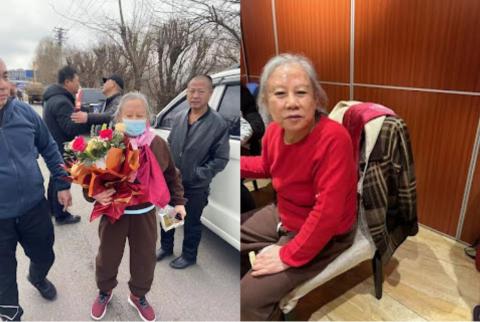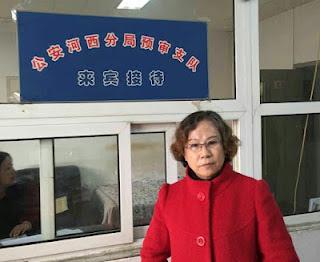Elderly Chinese rights lawyer who was tortured in detention is finally free

After six years and six months behind bars, 74-year-old Chinese human rights lawyer Li Yuhan is finally free.
Photos of her emerged over the weekend, wrapped up warm against northern China’s frigid winter temperatures and clutching a bouquet of flowers.
While she was incarcerated, this elderly woman was subjected to inhumane abuse and mental torture. This included denying her essential medicines for serious diseases such as heart issues, forcing her to take ice baths and depriving her of food and water. Officers also humiliated her by urinating on her food.
Li suffered multiple heart attacks in prison and lost her ability to walk unaided. Her family’s multiple appeals to secure her release on medical parole were all rejected.
Police detained Li in October 2017 in Shenyang, a city in northeastern China where she had gone to visit a client. They accused her of “picking quarrels and provoking trouble,” a public order crime that has long been used to imprison rights defenders.
For the first month, Li was illegally denied access to legal representation hired by her family. A month later, she was finally allowed to meet with a lawyer.
In 2018, police added an extra charge of “fraud”, likely to ensure she would get a lengthier sentence since the initial crime of picking quarrels carries a maximum five-year sentence.
After repeatedly delaying her trial without providing justification, judges finally heard her case in 2021 in a secret hearing.
But it took another two years for her to be sentenced to the six and a half years in prison in October 2023. Because of the lengthy time she had already been in detention, by the end of March she had served her sentence and was released.
In July 2023, the UN Special Rapporteur on Human Rights Defenders and other UN experts had called Li’s detention arbitrary and raised concerns about her ailing health, reports of ill treatment and excessive delays to the trial and sentencing.

Li was born in Shenyang but lives and works in Beijing. She has taken on many sensitive rights cases, including defending fellow woman rights lawyer Wang Yu in 2015. Wang was one of the first victims of China’s nationwide strike against rights lawyers that year – the 709 Crackdown -- when hundreds of legal workers were disappeared and imprisoned.
Among the rights law community in China, she was respectfully known as “big sister.”
Her work has been recognized internationally; in 2020, Li was awarded the Franco-German Prize for Human Rights and the Rule of Law.
According to Mang Mang magazine, Li came to human rights law rather late in her career. In the 1970s, she had a brief stint as a barefoot doctor (healthcare provider with some basic training), and then in a factory while she studied law part-time. In 1990, she qualified as a lawyer and soon began practicing.
Her path to human rights law was sparked by an injustice in her own family. In the late 1990s, her son was bullied so badly in school that he was left with a diagnosed mental illness. Neither the police nor the local government would help, so Li tried to use the law to get compensation. The father of one of the bullies hounded Li and her family so relentlessly that her husband divorced her, they were forced to flee their home and her son fled overseas.
In 2009, Li moved to Beijing and within a few years began to take on sensitive rights cases. She defended petitioners and religious followers who were persecuted by the police. Then, in 2015, she took on her most famous, and perhaps most dangerous case, that of Wang Yu. Some believe that her courage in defending Wang resulted in her subsequent arrest and long prison sentence.
According to Li’s lawyers, the evidence that she “picked quarrels and provoked trouble” was her repeated petitioning attempts in Beijing and Shenyang on behalf of her son. And her “fraud” charge? Well, that was attributed to her applications for financial assistance for her son’s mental disability.
One of her lawyers in 2017 that revealed details of her torture in detention was the late Li Baiguang. It would only be months later in February 2018 that he died in mysterious circumstances at a military hospital.
Li’s case is typical of that of many human rights lawyers in China, who have been arrested and sentenced simply for doing their job. Under Xi Jinping, Chinese police have effectively snuffed out the human rights law movement, with the 709 Crackdown in 2015 being the key turning point.
Today, almost all human rights lawyers in China have either lost their license, have been disappeared, are in detention or prison or have fled into exile.
For example, last year, China jailed two prominent rights lawyers Xu Zhiyong and Ding Jiaxi to more than a decade each for subversion of state power. Those who are stuck in China are often subjected to forced evictions, house arrest and placed under exit bans. Their families, including elderly parents and young children are also hounded through a system of collective punishment.
The few remaining lawyers who still have their licenses face threats and are constantly thwarted from meeting their clients – sometimes because their clients have been logged intentionally under a fake name by the detention centre, other times through stonewalling and manipulation of legal exceptions.
Many were also subjected to a type of incommunicado detention called Residential Surveillance at a Designated Location (RSDL), where they were held in conditions that are tantamount to torture. Wang Yu spent many months in RSDL; her account is recorded in our book, The People’s Republic of the Disappeared.
While Li was not held in RSDL, she was disappeared for her first month and illegally prevented from meeting with her lawyer.
China’s unfair justice system is so overtly politically-motivated that a lawyer has little chance of securing a not guilty verdict – China has a near 100% conviction rate – but having independent and effective legal help is still hugely important. It can offer a channel of communication between the detainee and the outside world and their family, it can allow instances of torture to be documented and may, to some extent, help to protect the detainee from abuse. Li’s mistreatment in detention reportedly improved after her lawyers repeatedly raised objections.
If you want to read more about these issues affecting human rights defenders in China, please click the links above or check our publications page.



